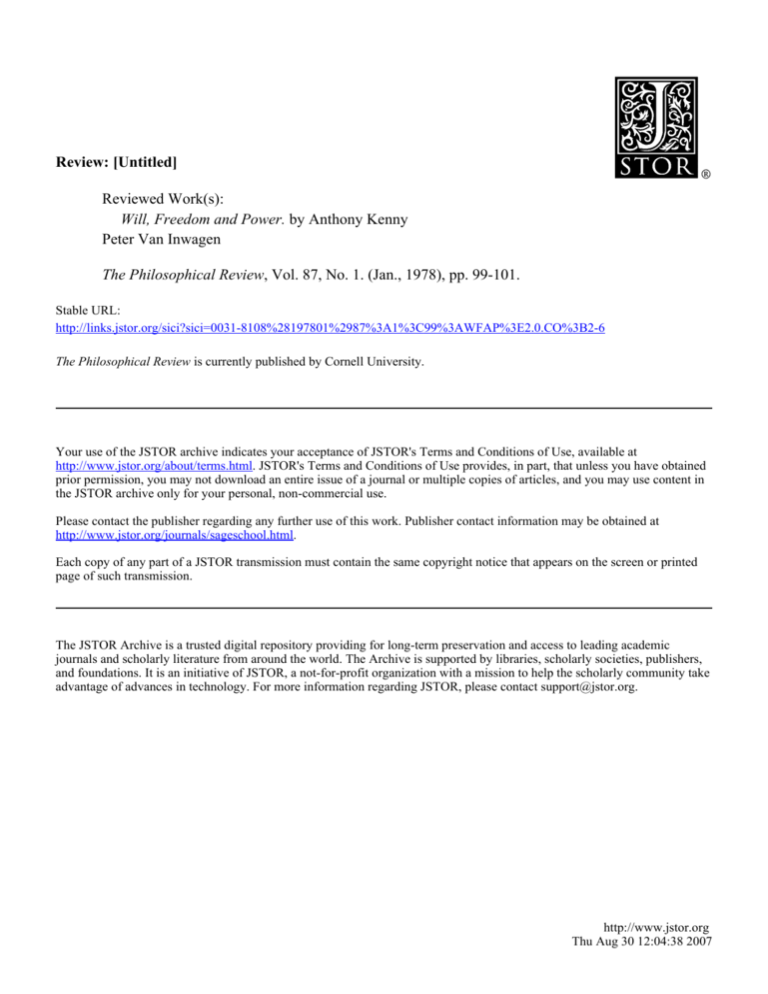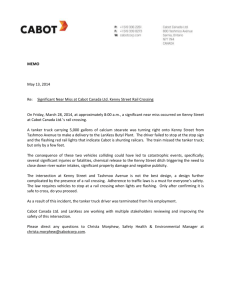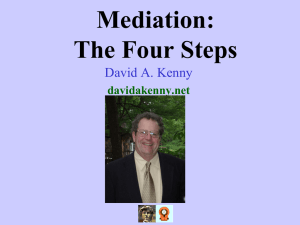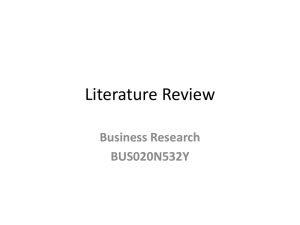Review of Will, Freedom, and Power by Anthony
advertisement

Review: [Untitled] Reviewed Work(s): Will, Freedom and Power. by Anthony Kenny Peter Van Inwagen The Philosophical Review, Vol. 87, No. 1. (Jan., 1978), pp. 99-101. Stable URL: http://links.jstor.org/sici?sici=0031-8108%28197801%2987%3A1%3C99%3AWFAP%3E2.0.CO%3B2-6 The Philosophical Review is currently published by Cornell University. Your use of the JSTOR archive indicates your acceptance of JSTOR's Terms and Conditions of Use, available at http://www.jstor.org/about/terms.html. JSTOR's Terms and Conditions of Use provides, in part, that unless you have obtained prior permission, you may not download an entire issue of a journal or multiple copies of articles, and you may use content in the JSTOR archive only for your personal, non-commercial use. Please contact the publisher regarding any further use of this work. Publisher contact information may be obtained at http://www.jstor.org/journals/sageschool.html. Each copy of any part of a JSTOR transmission must contain the same copyright notice that appears on the screen or printed page of such transmission. The JSTOR Archive is a trusted digital repository providing for long-term preservation and access to leading academic journals and scholarly literature from around the world. The Archive is supported by libraries, scholarly societies, publishers, and foundations. It is an initiative of JSTOR, a not-for-profit organization with a mission to help the scholarly community take advantage of advances in technology. For more information regarding JSTOR, please contact support@jstor.org. http://www.jstor.org Thu Aug 30 12:04:38 2007 BOOK RE VIEWS ways new to us (p. 199). Of all the essays, this one sticks closest to the Wittgensteinian last; it is also one of the best organized and most interesting. In summary, while Hunter's book cannot be highly recommended as a help in understanding Wittgenstein's work, several of the essays possess a good deal of independent interest. The author's writing is seldom elegant; often the essays would benefit from a tighter structure. Perhaps Hunter suffers a temptation to imitate Wittgenstein's style, but that needs a master to bring off. The book can be recommended as the effort of a good philosopher to fight his way through some thorny confusions; his attempt has sufficiently interesting successes (and failures) to warrant our careful attention. JAMES C. EDWARDS Furman University WILL, FREEDOM AND POWER. By ANTHONY KENNY.New York, Barnes & Noble, 1975. Pp. vi, 170. $15.00. Dr. Kenny's little book is about freedom. Philosophers have, broadly speaking, recognized two sorts of freedom (or "liberty"): freedom of spontaneity and freedom of indzference. T o possess freedom of spontaneity is to be free to do what one wills (hence, the "Will" of Kenny's title); to possess freedom of indifference is to possess a "twoway" power with respect to future action: to have the power both to lie and not to lie, to eat and not to eat, and so on (hence, "Power"). (Hume, of course, identified a belief in "liberty of indifference" with a belief in the absence of determining causes of action. Kenny points out [p. 1221 that whether or not Hume was correctly reporting the use of "liberty of indifference" in his own time, this scholastic term did not originally mean "freedom from antecedent causes.") The main contention of the book, the conclusion of its main line of argument, is that freedom of indifference is compatible with physical (or physiological) determinism. (Kenny is agnostic about the truth of the thesis of physical determinism.) The main line of argument seems to me to be this: as everyone admits, freedom of spontaneity is compatible with physical determinism; but, necessarily, an agent enjoys freedom of indifference if and only if he enjoys freedom of spontaneity; therefore, physical determinism and freedom of indifference are compatible. It is, of course, the second premise of this argument that requires support, and most of the book consists of analyses of the will and voluntary action and power that are intended to support this premise. (These analyses are derived BOOK RE VIEWS from those presented in Action, Emotion and W i l l ; Kenny has extended and modified the theory of that book in response to the criticism it has received since its publication in 1963.) It is the "if" of the second premise that is really controversial. Moreover, the "if' is all Kenny needs to establish his compatibility thesis. Why does Kenny think that, necessarily, if one is (say) free to eat if one wants, then one is able both to eat and not to eat? Roughly, because to be such that one will eat if one wants is to have the power to eat because one wants to; and it cannot be the case (Kenny argues) that one eats because one wants to unless one has it within one's power to refrain from eating. Consider for example (not Kenny's example) a man who a t any given moment is either revolted by the very thought of food or else seized by an irresistible desire to stuff himself. This unfortunate will sometimes fast and, if we suppose food to be available, sometimes feast. But we cannot say that when he feasts he feasts because he wants to. A man who eats because he wants to is, for Kenny, a man who in eating is acting on a decision that could in principle be explained by attributing to him a piece of practical reasoning whose conclusion is "Therefore, let me eat (this)." Practical reasoning, Kenny argues, is essentially defeasible. That is, a valid piece of practical reasoning, unlike a valid piece of theoretical or assertoric reasoning, can be invalidated by the addition of a premise. "Let me be full/If I eat this steak, I shall be full/ Therefore, let me eat this steak" is a valid piece of practical reasoning; the piece of reasoning got by adding "Let me be a vegetarian" to its premises, however, is not valid. Kenny argues (if I understand him) that psychological determinism is incompatible with our acting because we want to, since, if an agent's act were the inevitable outcome of his psychological state just prior to his performance of that act (say, of his beliefs and "pro-attitudes"), then this act could not be explained on the basis of his having made a defeasible practical inference. All this, of course, is merely a sketch of the general direction a n d a few of the high points of Kenny's argument. Perhaps even as such it is inaccurate. (There are many places in the book a t which I fail to follow Kenny; there are many others a t which I do not know whether what he is saying is supposed to be part of his main line of argument or merely a n interesting digression.) It may also suffer from my mistakenly attempting to "work in" theses that are not really part of his central argument. I should have been very grateful for something like an appendix containing a n outline of the argument of the book. Because of the difficulty of isolating the crucial premises of B O O K RE VIEWS Kenny's argument for careful philosophical scrutiny, the philosopher who (like me) finds the "compatibilist" thesis prima facie incredible is not likely to be convinced. He will want Kenny to analyze what seem to him to be obviously correct arguments for "incompatibilism" (arguments that have been presented much more clearly and concisely than Kenny's argument for compatibilism) and show where these arguments go wrong. In the last chapter of the book, Kenny attempts to do this. Unfortunately, the argument he chooses to examine is that of David Wiggins's "Towards a Reasonable Libertarianism."' I find Wiggins's argument to be almost impenetrable in its details (though tolerably clear in general outline; clear enough to be recognizable as a "version" of what I would call the standard argument for incompatibilism). And the question of the soundness of any given argument for the incompatibility of free will and determinism, will, I think, always turn upon what seemed a t first glance to be mere technical details. (One of the main difficulties with Wiggins's argument is that of interpreting what he means by "historical inevitability a t t." Kenny shows [p. 1551 that Wiggins's explanation of this notion is defective.) But there are well-known papers in which arguments are presented that have the same general strategy as Wiggins's argument but which are much clearer in detail. Carl Ginet's "Might We Have No Choice?"' is an excellent example. Kenny's concluding chapter would have been of greater value if he had chosen to examine an argument as clear as Ginet's. If I find Kenny's central arguments wholly unpersuasive, I nevertheless think his book is well worth reading. For one thing, it contains discussions of many disputed points in philosophical psychology and the theory of practical reasoning that anyone interested in these subjects will find extremely useful. Moreover, if the book is unconvincing, it is not unenlightening. Kenny is highly skilled a t producing the happy illustration, the illuminating metaphor, and the apt analogy. These skills are important; if no one possessed them, philosophical thinking would be a t best a formal exercise, a n exercise in the manipulation of concepts that had hardly any connection with the greater part of our mental life.3 PETERVANINWAGEN Syracuse University I. In Essays on Freedom of Action ed. by T . Honderich, (London, 1973). '. In Freedom and Determinism ed. by K . Lehrer, (New York, 1966). 3. The book is unfortunately marred by many typographical errors. For a list of the most important "sense-destroying" ones, see Bernard Mayo's review in Philosophical Books, XVIII, no. 1, Jan. 1977. 101




